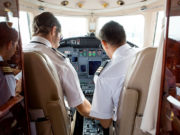The U.S. Federal Aviation Administration’s (FAA’s) oversight and certification practices will be the subject of a review by a government watchdog agency, which says it is especially interested in the process used by the FAA to establish pilot training requirements for the Boeing 737 MAX.
The Department of Transportation’s Office of Inspector General (OIG) said Monday that the review, which will begin later this month at the request of members of the U.S. House of Representatives, was prompted by concerns associated with the fatal crashes of two 737 MAX airplanes.
The crashes involved Lion Air Flight 610 on Oct. 29, 2018, after departure from Jakarta, Indonesia, and Ethiopian Airlines Flight 302 on March 10, 2019, after departure from Addis Ababa, Ethiopia. All passengers and crew in both airplanes ─ a total of 346 people ─ were killed.
The FAA certified the 737 MAX in March 2017.
“These fatal accidents have drawn widespread attention to FAA’s oversight and certification practices, including the agency’s process for establishing pilot training requirements for the aircraft,” the OIG said. “For example, at the time of the October 2018 fatal accident, pilots were reportedly unaware of the new automation system ─ known as the maneuvering characteristics augmentation system (MCAS) ─ that Boeing included on the MAX aircraft to improve aircraft performance.”
The report by the Indonesian accident investigation authority said that a contributing factor to the crash was “the pilots’ response to erroneous activation of MCAS.” The pilots’ actions raised “international concerns about the role of pilot training” in the accident, the OIG said.
In response, leaders of the Aviation Subcommittee of the House Committee on Transportation and Infrastructure asked the OIG to review domestic and international pilot training standards for commercial passenger airplanes, including training on automation.
The OIG said it would conduct that review and also examine requirements by other civil aviation authorities regarding pilot training on the use of flight deck automation.
